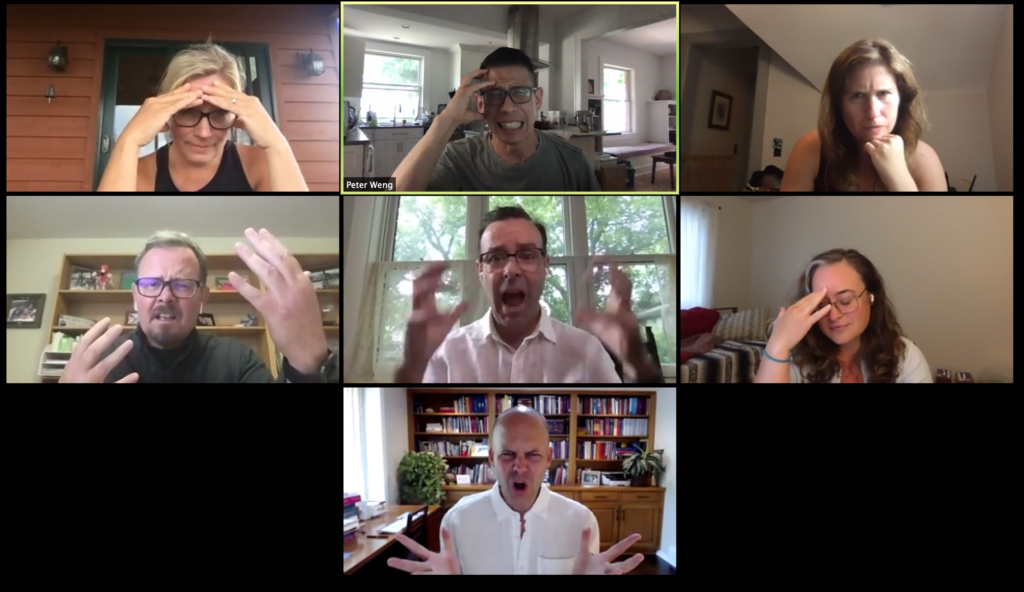Create a culture that means business™
Email address
This covers the value of awareness and is the first of a four-part blog series on mental well-being
In the midst of a heated senior management meeting yesterday on budget cuts, I noticed I was becoming agitated and frustrated at the resistance to budget cuts being expressed in the meeting. As CEO of the organization, I have a response due to the board of directors. Did some members of the meeting forget what was agreed upon in the last board meeting? Should I repeat the central issue for everyone to get back on track? Noticing the clenching of my jaw, I realized it may be good to consider my emotional state before getting back in the fray.
 Video conference of our leadership team in a follow-up meeting
Video conference of our leadership team in a follow-up meeting
Earlier in my career, a likely response to this type of situation from me would have included an angry haranguing of the group. Instead, I was successful yesterday in listening further before (semi-)calmly reminding everyone of those commitments.
Check in on your own awareness
The key factor in my much-improved modern-day response is awareness. Awareness of my clenched jaw highlighted to me that I was angry. That awareness signaled to me that it would be better to calm down a bit before speaking.
Here are three questions to ask yourself to check in on your own awareness:
- What do you remember about the first 30 min of your day today?
- How was your last interaction with another person?
- What do you notice about how you feel right now?
These questions relate to how we stay aware of our experiences throughout the day. Given the multitude of distractions and our busy schedules, the average U.S. adult is in a state of mind wandering 47 percent of the time rather than paying focused attention. This means that people are often not paying attention and aware of the activity they are doing or the people they are interacting with; or even of how they themselves are feeling and experiencing life. And this has potential implications in the workplace in terms of missing out on important aspects of interactions, work meetings, projects, and also of not noticing clearly our own emotional reactions. It also has potential negative aspects for personal life in how we engage with our friends and family.
Therefore, awareness is a foundational aspect of mental well-being – a state that allows one to flourish and fully engage in life. Fortunately, mental well-being is a skill. It can be trained and developed, and there are many traditional methods of training awareness utilizing contemplative practices. Our organization, Healthy Minds Innovations, has its origins in the pioneering neuroscience research of our founder, Dr. Richard Davidson. Dr. Davidson did some of the first studies to show that contemplative practices can fundamentally alter the physiology of the brain in ways that support long-term mental well-being. In a recent survey we conducted in partnership with YouGov, we found that U.S. office workers are turning to contemplative practices such as meditation and mindfulness practices to help them address the recent stresses caused by, for example, changes to work and society caused by the COVID-19 pandemic. Let’s explore how these practices support awareness.
Mindfulness and meta-awareness
We are looking to enhance our awareness of our experiences at any given moment (present moment awareness – “mindfulness”) and we are also seeking to further develop the ability to notice what we are paying attention to (“meta-awareness”). An example of meta-awareness is back in your student days when you noticed you were not paying attention to a teacher in class and realized that you were daydreaming.
These two abilities of (1) paying attention in the present moment and (2) noticing where we are directing our attention, allow us to fully focus our attention to the things we want to focus on (a discussion, a task, a meeting, etc.) instead of accidentally slipping in to that 47 percent-of-the-time mind wandering state. We are also better equipped to address difficult emotions. Being able to pay attention and clearly identify the emotional responses we have can provide us with options on how we behave.
Here’s a way you can work on your own or your team’s meta-awareness right now, in the midst of this new, virtual world:
- Notice things: If you are moving from project to project and task to task, stop and take a “tour of the senses.” Look at your pen on the desk and recognize its color, its shape, the way it reflects the light. Feel the air on your skin, smell the fabric softener on your shirt, swallow. Notice how your body feels when different emotions are present.
- Sit with your feelings and ask yourself questions: What am I thinking? What am I feeling? Make a habit of asking yourselves these questions and then observe whatever thoughts and emotions are present. When in difficult discussions, reflect on the accuracy of your view. What would be helpful in this discussion?
- Create a “Thought Log”: Did you lose your patience? Write it down and reflect on how your body felt, when you felt your emotions take over, and how you “came down.” Studying your patterns can help you be aware to modulate them in the future.
- Set an awareness/mindfulness alarm: You can use technology to help by setting an alarm (each hour, for example) as a reminder to pause, take a deep breath, and notice what you are feeling and sensing in that moment.
These small activities can make a real, long-lasting change in your behavior and the behavior of others. It’s not new information that a “bad/angry boss” can be a main driver in attrition: Gallup revealed that 50 percent of employees who quit their job cite their manager as the reason. Spending time training your mind to be present and in tune with your emotions is a key step to becoming a better leader and people manager.

Build a culture of well-being
Building a culture of well-being can help shift your workplace culture from a state of stress and burnout to one of engagement and resilience. As a start, you can share the above simple tips with your team. Or, you can practice together at the start of a meeting, like this team practice for mindful listening, or just set a timer for a minute to bring awareness to the present moment.
Modeling healthy behavior for your team can reduce tension, promote collaboration, and create more effective workplaces. In our workplace program, Healthy Minds @Work, we guide employees on a path to mental well-being through training the mind in the areas of Awareness, Connection, Insight, and Purpose (ACIP). In a recent pilot study of the program (using the ACIP framework), participants had significant reductions in stress (28 percent) and anxiety (18 percent), while increasing feelings of social connection (13 percent).
In these challenging times, investing effort to promote mental health will support your teams to not just survive but to thrive. It is an investment in the future of your organization because the employees who stay tomorrow will remember how you led them today.
Working on self-awareness and developing ways to regulate your emotions is a key to supporting a team and yourself for the challenges ahead. Even in those budget cut meetings.
To learn more about the power of leadership awareness, access Achievers’ webinar, “The Humanity Component: Better Quality of Life = Better Quality of Business.”

